
04/03/2021
Uruguay is a reference in the region for its zero alcohol tolerance law in traffic
OPS and the Fundación Gonzalo Rodriguez conducted a research based on national and international publications to determine the impact of alcohol on accident rates.
The research identified 13 publications in peer-reviewed journals and four papers that form the basis of the evidence found. Among them, a review of 112 studies between 1981 and 1998 linked to experiments with different concentrations of alcohol in the blood proves that several of the skills necessary for driving are altered with measures other than zero. Likewise, another study shows that alcohol-impaired drivers are more impulsive and risky, and their judgment, vigilance, reaction time and control diminish accordingly.
States with more restrictive drinking standards have lower fatality rates, is the conclusion of a study linking alcohol levels and traffic fatalities and an index for evaluating public policy and legislation.
The most recent quasi-experimental study looked at the importance of the zero alcohol law in reducing accident rates. The "synthetic control method" was used. It uses two populations: one receives a treatment or intervention (treatment group), the other receives none (placebo or control group), and the results of an intervention are compared before and after the intervention. In this case, Uruguay was used for the treatment group and Chile as the control group (because it is the most similar country and since 2015 has a general alcohol limit of 0.3 g/l as the one in force prior to the "zero law" in Uruguay).
Each traffic crash in these countries was assigned using the geographic labels available by region. Since after the intervention there is no data on what would have happened in Uruguay if the "zero law" had not been enacted, counterfactual data were created using this model to make comparisons. The results obtained show significant reductions in fatal accidents in Uruguay in the following 12 (-20.9%) and 24 months (-14.1%) after the enactment of the law (period 2016-17). For accidents with injuries (serious or minor) there are no significant changes with the enactment of the zero alcohol law.
In Germany, a study on casualties with blood alcohol concentration and sober people showed that the former had a higher mortality rate before entering the hospital. However, an analysis made in Canadian centers shows a lack of relationship between the level of alcohol consumed and the severity of injuries in traffic accidents. The information prepared in Uruguay by the Emergency Department of the Hospital de Clínicas concludes that "the possibility of severe trauma is given by the mere fact of having drunk alcohol, regardless of its quantity". The same report highlights a possible underreporting in the number of positive spirometry tests in serious accidents and blood alcohol analysis in fatal accidents, in line with other international research.
Uruguay exceeds the prevalence of the Americas in episodic heavy episodic drinking. This is defined by at least 5 standard units of drinking per occasion, at least once a month. In 2016, in the country the record was 39.7% among men and 10.5% among women; in the Americas, 35% in men and 8.2% in women. For the WHO, 9.6% of men and 3.4% of women in Uruguay present an alcohol use disorder.
From the review, it appears that alcohol in quantities much lower than those required to produce intoxication generates physiological and cognitive effects. The ability to drive is affected at levels below 0.05% and, therefore, is not related to intoxication.
The Director General of the Ministry of Public Health, Miguel Asqueta, acknowledges that Uruguay did not achieve the goal of a 30% reduction in road crashes, nor was significant progress made towards achieving the Sustainable Development Goals of halving road traffic deaths and injuries.
Context and background
Uruguay adapted in 2015 the United Nations General Assembly resolution 64/255 on improving global road safety. That year, the law establishing for vehicle drivers the prohibition of driving with alcohol in blood was enacted. The new regulation modified article 45 of law 18.191 of 2007, which established a progression to reduce the maximum authorized levels; the limit of 0.8 grams was reduced to 0.3 grams in blood, until it reached zero. Since the change, Uruguay has positioned itself as a leader in the region.
The Zero Alcohol Law has not negatively impacted sales of alcoholic beverages, as between 2013 and 2019 sales of alcoholic beverages have not decreased.
The Pan American Health Organization warns that an eventual modification of the 19.360 law could result in a contravention of the prohibition of regressivity in HR, according to the legal advisor in Human Rights in the region, Alejandro Morlachetti.
- Share: